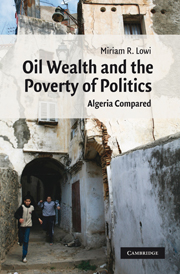Book contents
- Frontmatter
- Contents
- List of tables
- List of figures
- Preface
- Map of Algeria
- Part I Introduction
- Part II Algeria and its discontents
- Part III Comparisons and conclusions
- 7 Variations on a theme: comparators in the Muslim world
- 8 Conclusions: oil wealth and the poverty of politics
- Bibliography
- Index
- CAMBRIDGE MIDDLE EAST STUDIES 32
7 - Variations on a theme: comparators in the Muslim world
Published online by Cambridge University Press: 29 March 2010
- Frontmatter
- Contents
- List of tables
- List of figures
- Preface
- Map of Algeria
- Part I Introduction
- Part II Algeria and its discontents
- Part III Comparisons and conclusions
- 7 Variations on a theme: comparators in the Muslim world
- 8 Conclusions: oil wealth and the poverty of politics
- Bibliography
- Index
- CAMBRIDGE MIDDLE EAST STUDIES 32
Summary
With the story of Algeria as the backdrop, how can we account for the variation in stability in high-growth, development-oriented, oil-exporting countries in the aftermath of an economic shock? If we consider a sample of oil-exporting states that share certain commonalities with Algeria, how can we explain that in some, contentious politics provoked regime collapse, while in others it did not, and in still others, weakened states confronted for some time by determined challengers managed to re-stabilize?
Recall that Iran and Indonesia succumbed to regime breakdown and system change, in 1979 and 1998 respectively, although Indonesia had successfully weathered previous economic shocks. Saudi Arabia, in contrast, remained stable, despite a severe economic downturn in the late 1980s, and the regime has prevailed. Like Algeria, Iraq became acutely unstable after the 1986 shock, but the regime was able to re-equilibrate into the 1990s. What accounts for regime breakdown and change in Iran in 1979 and in Indonesia in 1998? Why was Saudi Arabia spared a similar outcome to Iran or Indonesia, and how has it managed to remain relatively stable? Why was Indonesia able to weather earlier shocks – in 1986, for example – but not later ones? Furthermore, why were Algeria and pre-Gulf War Iraq, despite suffering acute instability and regime crisis from the late 1980s, able to eventually step back from the brink and re-equilibrate?
- Type
- Chapter
- Information
- Oil Wealth and the Poverty of PoliticsAlgeria Compared, pp. 147 - 176Publisher: Cambridge University PressPrint publication year: 2009



